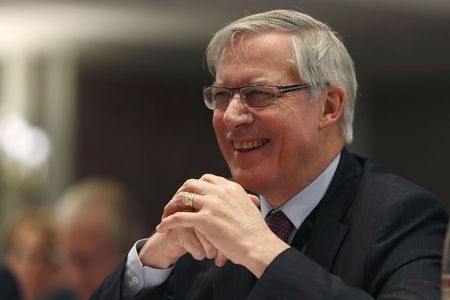By Stanley White
TOKYO (Reuters) - European Central Bank Governing Council member Christian Noyer said on Tuesday the central bank's statements on the size of its balance sheet are not a firm commitment but an expectation of how large the balance sheet will grow.
Noyer, who is also governor of the Bank of France, said these statements were still a powerful signal that there would be no qualitative limits to further policy easing if needed.
He also reiterated the ECB's commitment to take more steps if needed to respond to low inflation, but there are growing concerns the central bank's balance sheet will not expand as it expects unless it starts buying euro-zone government bonds.
"The statement by the Governing Council is not formulated as a firm commitment but as an expectation," Noyer said.
"Nevertheless, it is very significant. Communication on the size gives a very concrete signal and content about future policy intentions."
ECB President Mario Draghi has set a target of returning the ECB's balance sheet to its level of March 2012 - around 3 trillion euros (2.36 trillion pounds), compared with the current 2 trillion.
The whole policymaking Governing Council has thrown its support behind this plan, but initially some policymakers were worried Draghi committed the ECB to balance sheet expansion without building enough consensus.
The ECB has been doling out cheap loans to banks, known as LTROs. The ECB has also started buying covered bonds and asset-backed securities, but many analysts doubt these schemes can push the balance sheet up by a trillion euros.
Buying government bonds would take the ECB into the realm of quantitative easing used by the Bank of Japan and the U.S. Federal Reserve, but the policy is very contentious in Europe.
Some policymakers say it is possible for the ECB to buy government debt, but other policymakers and politicians from Germany say this move is beyond the ECB's legal mandate.
The ECB remains committed to using additional unconventional measures that fall within its mandate, Noyer said on Tuesday.
Noyer also said the ECB has not bought government debt up until now because it would give the impression the ECB is choosing which euro-zone countries should have lower yields.
The euro zone economy is mired in low growth and weak inflation, and the ECB in recent months stepped up its efforts to boost the recovery by flooding the market with billion of euros to unblock lending channels to households and companies.

(Editing by Chris Gallagher & Shri Navaratnam)